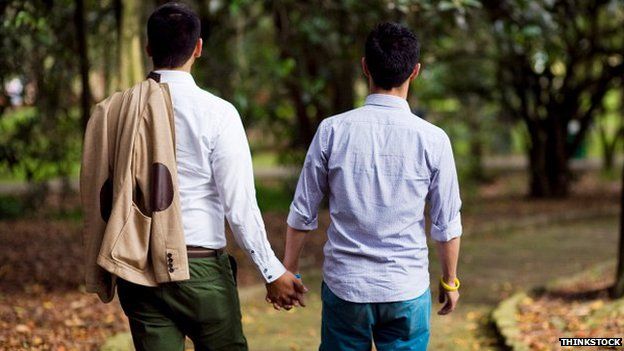Gay marriage is 'economic sense' say Australian firms
-
Gay marriage is 'economic sense' say Australian firms - BBC News
http://www.bbc.com/news/business-32655943
By Phil Mercer
BBC News, Sydney

In Australia, at least 18,000 same-sex couples are waiting for the law to change to allow them to get married, according to the University of Queensland.
If, and when, their big day comes, it could be an expensive business covering the cost of hotels, caterers, photographers and florists, not to mention clothes, rings and a honeymoon.
Campaigners estimate that the average Australian wedding has a price tag of around 35,000 Australian dollars ($27,000; £18,000).
"The world's expert body on the economic impact of marriage equality, the Williams Institute at UCLA, says the most conservative estimate for the [potential] wedding spend of Australian same-sex couples is A$161m," says Rodney Croome, the national director of Australian Marriage Equality.
"It could be as high as A$600m.
"On top of this, Australia's failure to achieve marriage equality is a competitive disadvantage when it comes to attracting those skilled migrants and investors for whom non-discriminatory laws are important."
Two men holding hands
Productivity boost
This week the campaign for reform in Australia received some high-profile support from Alan Joyce, the openly gay, Irish-born chief executive of the airline Qantas.
He told the Sydney Morning Herald: "I've had people coming up to me in the business community and saying that their son, their daughter is finding it tough (being gay), even in this day and age.
"Talking about how important it is for a business leader … to express our views on things. It is a role model thing."
The Flying Kangaroo has a long tradition of equality for its staff.
Peter Fraser and Gordon Stevenson getting married under UK law in Australia
Image caption
Peter Fraser and Gordon Stevenson were the first same-sex couple to be married in Australia - under UK law at the British consulate in Sydney
Tim Harcourt, an economist at the University of New South Wales Business School, says Australia's national airline has been a beacon of progressive thinking.
"When I worked at Qantas they were always ahead of the game in providing benefits for same-sex partners, whether it be travel or superannuation or so on," he tells the BBC.
"It has worked out pretty well on the basis that having a happy and egalitarian workforce is good for productivity."
Corporate campaign
Other corporate heavyweights are joining the campaign for same sex marriage in Australia. Telecom giant Telstra Qantas and PricewaterhouseCoopers have signed an open letter urging the conservative government to consider the economic benefits of reform.
They have been joined by the nation's biggest banks, ANZ, the Commonwealth and Westpac, along with retailer David Jones.
The letter states: "Not only is marriage equality the only truly fair option, but it's also a sound economic option given that a happy workforce is a productive one.
"To remain competitive, and to attract top talent from around the world, organisations - and nations - must create a fair and respectful environment for all."
A protester during a gay rights march through Sydney
Image caption
Many firms say Australia's failure to reform its marriage law puts the country at a competitive disadvantage
Alex Greenwich, an openly gay member of the New South Wales parliament and a former businessman, who ran a recruitment agency before entering politics, believes that employees who are happy and respected at work are more productive.
"There have been so many studies done on the importance of diversity within the workplace and the importance of accepting and treating your staff well in the workplace.
"It's kind of a no-brainer," says Mr Greenwich, who believes it is time for Australia to shed its reputation for sexual intolerance.
"We know that gay and lesbian people are out and open in very senior levels in a number of corporates across the world, and a lot of them are now saying why do we want to go to a country where we'll be treated as a second-class citizen?"
Religious objections
The importance of the so-called 'pink dollar' is felt around in the world where reform has been embraced.
But this has done little to soften those opposed to change, who argue that any alterations to Australia's marriage laws would be a backward step.
"I think it is disappointing when we have big business trying to influence governments, and for big business to use their clout in this way is intimidating," says Wendy Francis, the Queensland director for the Australian Christian Lobby.
"What is good for the economy is stable families and that is what we are really wanting to protect in Australia."
Bills to allow gay Australians to marry have been rejected by parliamentarians in the past, and there is currently no legislative timetable for further debate in Canberra.
Protestors in favour of gay marriage rights in Melbourne in 2008
Image caption
Moves to allow gay Australians to marry have been rejected in the past
The conservative Prime Minister Tony Abbott has deep-seated religious objections, although opinion polls have suggested a majority of voters would be in favour of marriage equality.
New Zealand reforms
While there is resistance at a federal level, laws now exist in New South Wales, Tasmania, Queensland, and Victoria, as well as the Australian Capital Territory that legally recognise same-sex unions.
Two years ago, New Zealand became the first country in the Asia-Pacific region to legalise same-sex marriages, and the architects of change believe it has had a transformative effect.
"All gay and lesbian people that I encounter are holding their heads just a wee bit higher because they know that the law no longer distinguishes between them and our heterosexual counterparts in this area at least," says Kevin Hague, a Green Party MP, who worked on marriage equality campaign.
"I know that popular wedding destinations like Queenstown and Rotorua have had a real boom time with same-sex couples from Australia coming over the get married here."